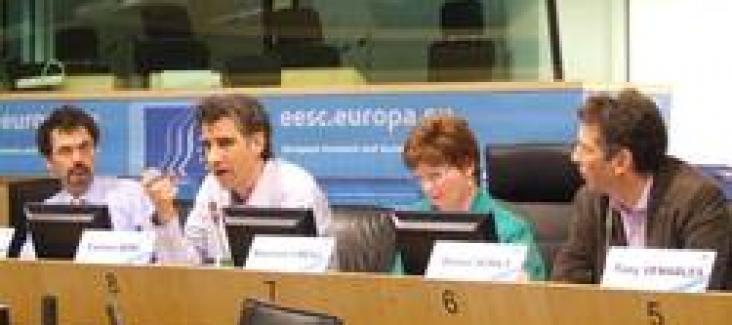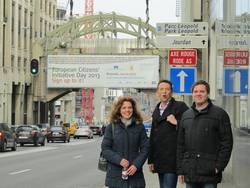
ECI Day 2013
The European Economic and Social Committee (EESC), in partnership with the Committee of the Regions (CoR), the European Citizen Action Service (ECAS), Democracy International and the Initiative and Referendum Institute Europe organised an "ECI Day" in Brussels on 9 April 2013. On the occasion of the ECI's first anniversary it was time to assess the first year of the ECI in practice, to hear the experience of organisers, to draw conclusions from the lessons learnt, to devise intermediate solutions to problems and to start preparing for the 2015 revision of the regulation.
Our assessment of ECI day:
ECI Day in Brussels: Civil Society, make it work!
The European Citizens’ Initiative (ECI) has been one year in practice, but neither EU politicians nor civil society organisations are happy with the instrument. Originally praised as the first tool of transnational direct democracy, “ECI Day” in Brussels on 9 April 2013 showed that the requirements of the ECI must change to be an influential and effective law-making instrument. It became apparent that European civil society organisations must live up to its responsibility and provide logistical and advisory support. Also, we should start campaigning for the revision of the EU legislation on the European Citizens’ Initiative, which is foreseen by April 2015.
This is the conclusion that we arrived at while travelling back from Brussels to our office in Cologne, Germany. The journey takes a good two hours by car if you are not stuck in a traffic jam, which happened to us somewhere in between Antwerp and Liège. So Ronald Pabst and Daniel Schily, our intern Andreas Müller and I had enough time to reflect on the statements and reports we had listened to for almost eight hours in the European Economic and the Social Committee. This is an advisory body of the EU institutions, which defines itself with the slogan “a bridge between Europe and organised civil society”.
Crossing the bridge
The EESC had hosted the event in partnership with the European Action Service (ECAS), IRI Europe and Democracy International. Euronews was also present to shoot some pictures for the EU. According to the slogan of the EESC, the about 100 conference participants were the organised civil society that met “Europe” or more strictly speaking the EU, which was most prominently present with Maroš Šefčovič, EU Commissioner responsible for the ECI.
In his account of the ECI one year in practice, Commissioner Šefčovič called the ECI a “success”, yet not unqualified. He admitted that the EU Commission had underestimated the issue of data protection and the set-up of the software to register the one million required signatures online. He stressed that the European Commission should play no other role than providing the software, while the actual duty of campaigning for electronic signatures and giving advice had to be on the organisers themselves. In this context also, an independent contact point should exist. It should not be provided by the European Commission, which is the current situation following a last-minute move before the EU legislation of the ECI was adopted.



